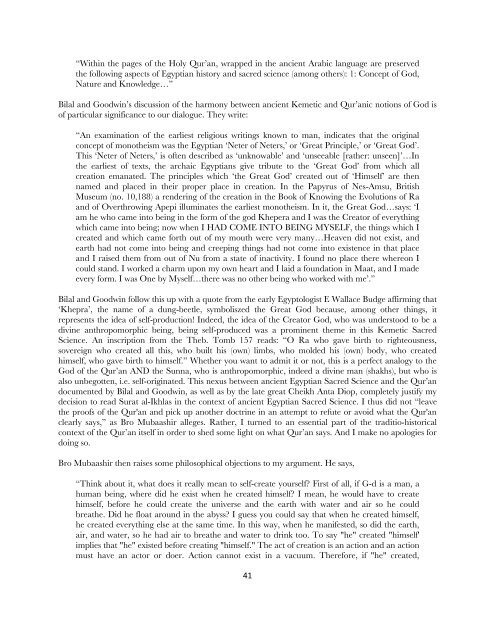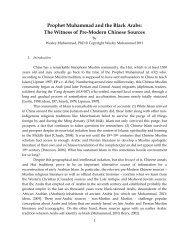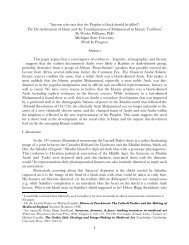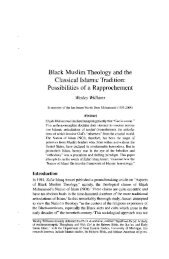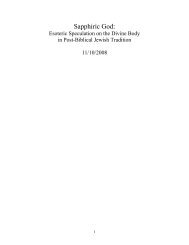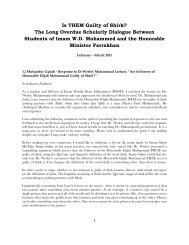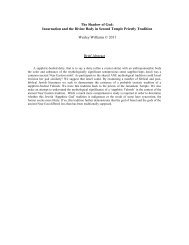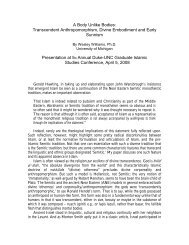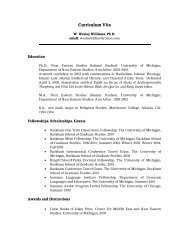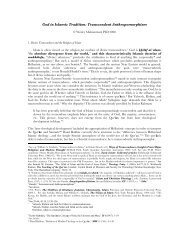Is THEM Guilty of Shirk? - Dr. Wesley Muhammad
Is THEM Guilty of Shirk? - Dr. Wesley Muhammad
Is THEM Guilty of Shirk? - Dr. Wesley Muhammad
Create successful ePaper yourself
Turn your PDF publications into a flip-book with our unique Google optimized e-Paper software.
―Within the pages <strong>of</strong> the Holy Qur‘an, wrapped in the ancient Arabic language are preserved<br />
the following aspects <strong>of</strong> Egyptian history and sacred science (among others): 1: Concept <strong>of</strong> God,<br />
Nature and Knowledge…‖<br />
Bilal and Goodwin‘s discussion <strong>of</strong> the harmony between ancient Kemetic and Qur‘anic notions <strong>of</strong> God is<br />
<strong>of</strong> particular significance to our dialogue. They write:<br />
―An examination <strong>of</strong> the earliest religious writings known to man, indicates that the original<br />
concept <strong>of</strong> monotheism was the Egyptian ‗Neter <strong>of</strong> Neters,‘ or ‗Great Principle,‘ or ‗Great God‘.<br />
This ‗Neter <strong>of</strong> Neters,‘ is <strong>of</strong>ten described as ‗unknowable‘ and ‗unseeable [rather: unseen]‘…In<br />
the earliest <strong>of</strong> texts, the archaic Egyptians give tribute to the ‗Great God‘ from which all<br />
creation emanated. The principles which ‗the Great God‘ created out <strong>of</strong> ‗Himself‘ are then<br />
named and placed in their proper place in creation. In the Papyrus <strong>of</strong> Nes-Amsu, British<br />
Museum (no. 10,188) a rendering <strong>of</strong> the creation in the Book <strong>of</strong> Knowing the Evolutions <strong>of</strong> Ra<br />
and <strong>of</strong> Overthrowing Apepi illuminates the earliest monotheism. In it, the Great God…says: ‗I<br />
am he who came into being in the form <strong>of</strong> the god Khepera and I was the Creator <strong>of</strong> everything<br />
which came into being; now when I HAD COME INTO BEING MYSELF, the things which I<br />
created and which came forth out <strong>of</strong> my mouth were very many…Heaven did not exist, and<br />
earth had not come into being and creeping things had not come into existence in that place<br />
and I raised them from out <strong>of</strong> Nu from a state <strong>of</strong> inactivity. I found no place there whereon I<br />
could stand. I worked a charm upon my own heart and I laid a foundation in Maat, and I made<br />
every form. I was One by Myself…there was no other being who worked with me‘.‖<br />
Bilal and Goodwin follow this up with a quote from the early Egyptologist E Wallace Budge affirming that<br />
‗Khepra‘, the name <strong>of</strong> a dung-beetle, symboliszed the Great God because, among other things, it<br />
represents the idea <strong>of</strong> self-production! Indeed, the idea <strong>of</strong> the Creator God, who was understood to be a<br />
divine anthropomorphic being, being self-produced was a prominent theme in this Kemetic Sacred<br />
Science. An inscription from the Theb. Tomb 157 reads: ―O Ra who gave birth to righteousness,<br />
sovereign who created all this, who built his (own) limbs, who molded his (own) body, who created<br />
himself, who gave birth to himself.‖ Whether you want to admit it or not, this is a perfect analogy to the<br />
God <strong>of</strong> the Qur‘an AND the Sunna, who is anthropomorphic, indeed a divine man (shakhs), but who is<br />
also unbegotten, i.e. self-originated. This nexus between ancient Egyptian Sacred Science and the Qur‘an<br />
documented by Bilal and Goodwin, as well as by the late great Cheikh Anta Diop, completely justify my<br />
decision to read Surat al-Ikhlas in the context <strong>of</strong> ancient Egyptian Sacred Science. I thus did not ―leave<br />
the pro<strong>of</strong>s <strong>of</strong> the Qur'an and pick up another doctrine in an attempt to refute or avoid what the Qur'an<br />
clearly says,‖ as Bro Mubaashir alleges. Rather, I turned to an essential part <strong>of</strong> the traditio-historical<br />
context <strong>of</strong> the Qur‘an itself in order to shed some light on what Qur‘an says. And I make no apologies for<br />
doing so.<br />
Bro Mubaashir then raises some philosophical objections to my argument. He says,<br />
―Think about it, what does it really mean to self-create yourself? First <strong>of</strong> all, if G-d is a man, a<br />
human being, where did he exist when he created himself? I mean, he would have to create<br />
himself, before he could create the universe and the earth with water and air so he could<br />
breathe. Did he float around in the abyss? I guess you could say that when he created himself,<br />
he created everything else at the same time. In this way, when he manifested, so did the earth,<br />
air, and water, so he had air to breathe and water to drink too. To say "he" created "himself'<br />
implies that "he" existed before creating "himself." The act <strong>of</strong> creation is an action and an action<br />
must have an actor or doer. Action cannot exist in a vacuum. Therefore, if "he" created,<br />
41


